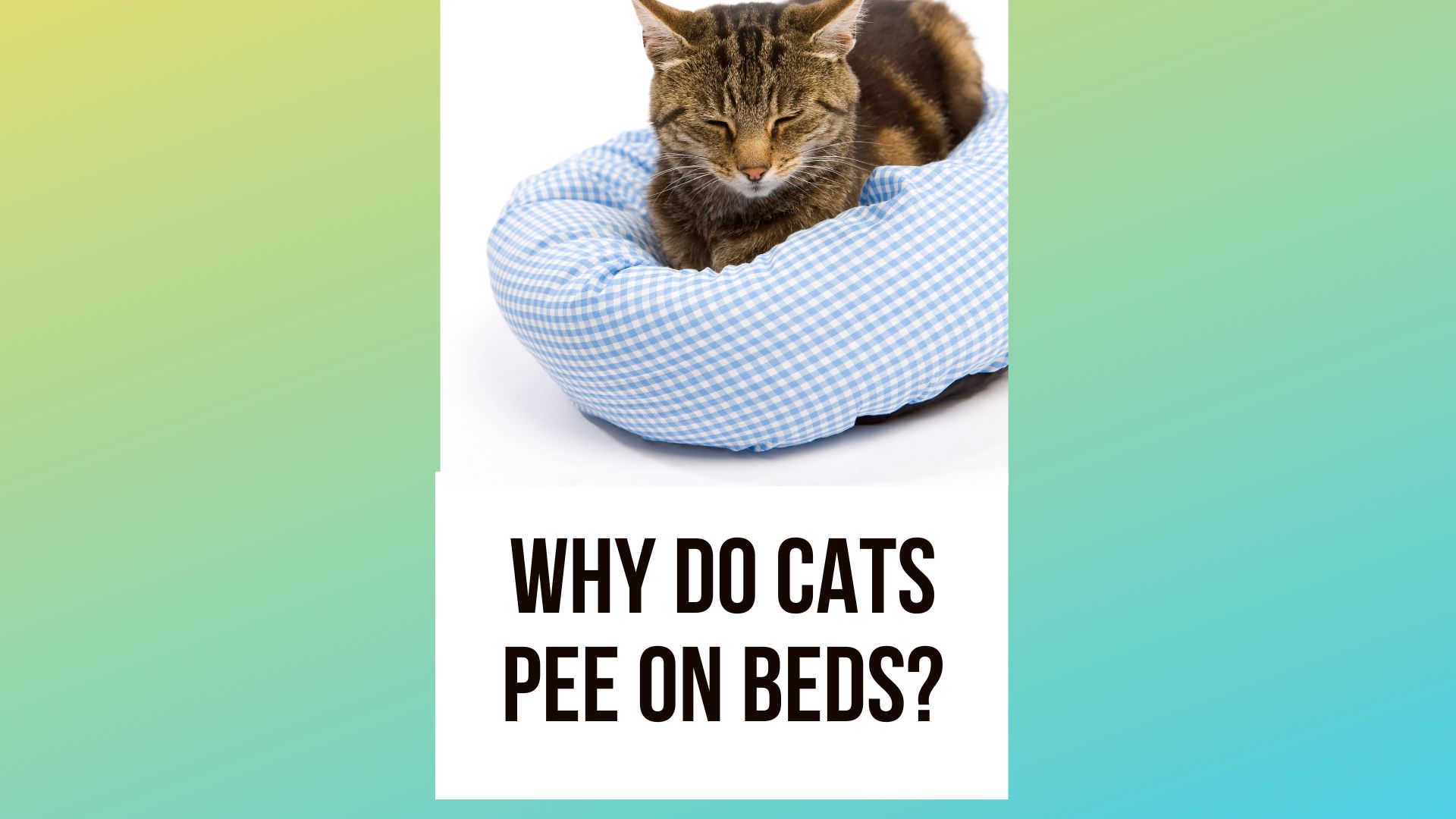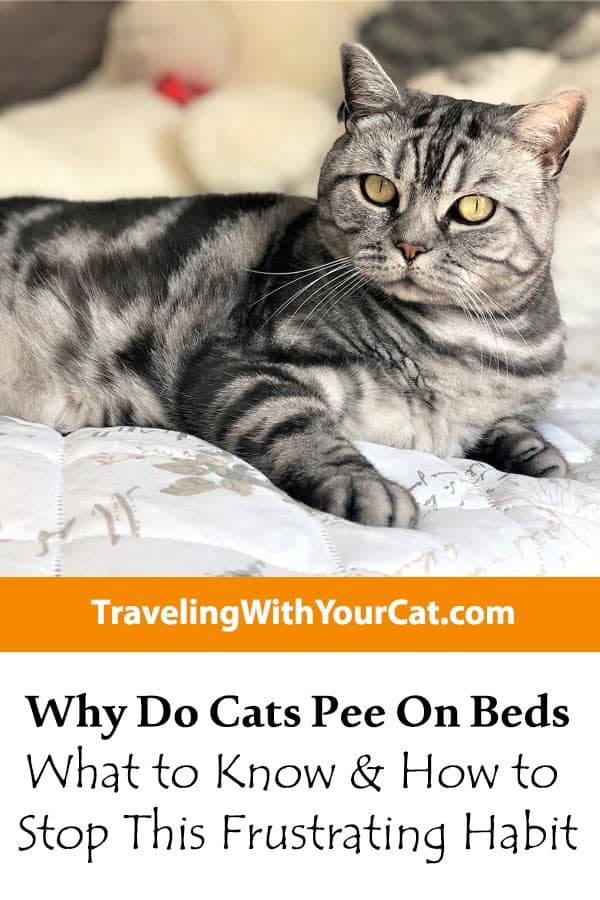
Waking up in the middle of the night covered in cat pee is not any cat owner’s idea of a good time. Having it happen night after night is a recipe for sleepless nights and serious frustration.
But why do cats pee on beds? Is your cat trying to send you a message? What can you do to make the behavior stop?
We answer these questions and much more in this article.
Why Do Cats Pee On Beds?
The most urgent reason cats pee on beds is urinary blockage or incontinence. Both require immediate veterinary care.
Other common reasons cats pee on beds can include behavioral issues, litter box problems, and changes to daily routine or environment.
Learn About Cat Peeing on Bed From a Feline Veterinarian
As this short YouTube video explains, the first step with any type of inappropriate elimination is always to have your cat examined by a feline veterinarian.
If all is well with your cat’s health, there are several other effective steps you can take to troubleshoot and solve the problem.

When Cats Peeing on Beds Is a Veterinary Problem
As PetMD highlights, there are several potentially serious medical reasons that may cause your cat to pee in your bed.
We will talk about the most common of these here because if you even mildly suspect your cat may have urinary issues, it is vital to schedule a veterinary exam right away!
Feline bladder infection
Feline lower urinary tract disease, or FLUTD, is actually a group of medical conditions that can affect a cat’s lower urinary tract and bladder.
According to the American Veterinary Medical Association (AVMA), frequent urination, blood in the urine, urinating out of the litter box, and discomfort while urinating are all common warning signs.
Feline urinary blockage
Urinary blockage is perhaps the most serious and also the most commonly overlooked medical cause for cats that pee in their owner’s bed or anywhere outside the litter box.
A urinary blockage can quickly become fatal. The warning signs are quite similar to FLUTD except that little to no urine actually gets passed.
Feline urinary incontinence
Many older cats will begin to suffer from feline urinary incontinence or difficulty holding it when the urge to pee comes.
As Michigan State University College of Veterinary Medicine points out, one of the common warning signs of feline urinary incontinence is intermittent dribbling and dripping rather than a full voiding of urine.
Feline bladder stones
As the Cornell University College of Veterinary Medicine explains, bladder stones are more common in cats that do not take in enough fluids, don’t exercise enough, and don’t urinate frequently.
This may cause a cat to urinate at night, especially when they are laying down and it may be more comfortable for them to pass urine as opposed to squatting in the litter box.
When Cats Peeing on Beds Is a Litter Box Problem
Vetstreet explains that any time a cat chooses to pee somewhere other than the designated litter box, it is time to do two things: schedule a veterinary exam and evaluate the litter box situation.
If your feline veterinarian gives the all-clear as far as your cat’s urinary health, then the litter box becomes a far more likely suspect.
Cats are known to be picky about where they go to the bathroom. Cats like cleanliness, privacy, space, shelter, and litter that does not irritate their sensitive paws or emit unpleasant odors.
Not all cats like the same type of litter box or litter, either! This can make it especially tricky if you live in a multi-cat household!
So let’s examine each component, in turn, to try to hone in on what your cat may not like about their litter box.
Cats like options
You may think that you only need to provide one litter box for your cat. But as Petfinder explains, the actual correct ratio is 1.5 litter boxes for every one cat.
If that makes you scratch your head, consider this: how close do you want your bathroom to be when you have to go?
Perhaps you live in a large single-level house or a multi-story house. Even if you only have one cat, your cat will want to have a bathroom close at hand when nature calls.
A cat that has to travel a relatively long distance from your bed to the litter box may choose to simply pee in the bed instead.
Cats need protection
Comfort is a loaded topic when it comes to feline litter boxes. Cats in a wild setting are both predators and prey. And having to go to the bathroom is a very vulnerable activity so they want extra protection.
Does the litter box make your cat feel too exposed and easy to see? This may be a reason they prefer to burrow down in your bed to pee instead.
Cats like comfort
When your cat routinely avoids the litter box in favor of your bed, think about whether you have recently changed the litter you use. Some cat litters are sharp and can hurt a cat’s paws or get lodged between the toes.
Sometimes a cat just doesn’t like a certain type of litter. Changing the litter might make the litter box a more workable option for your cat.
Cats like cleanliness
Most cat owners dislike cleaning the litter box. And all cats dislike going to the bathroom while standing in their own or another cat’s waste.
Cats like privacy
While dogs typically do their business right out in the open for all to see, cats typically prefer privacy – even from other feline housemates.
If the litter box is constantly occupied, your cat may simply seek out a more private, comfortable place to pee – like your bed.
When Cats Peeing on Beds Is a Behavioral Problem
Sometimes you will work through all of these options and your cat still chooses to pee on your bed.
When this happens, it is time to look even deeper, as Cat Behavior Associates explains.
You can look first to see if anything in your cat’s daily routine has recently changed. Perhaps you have had to work longer hours and your cat has been home alone more often. Maybe a family member has recently left or someone new has moved in.
Or it could be that you have added a new pet to the family or have recently lost one of your animals.
Sometimes it even turns out that there are conflicts between two cats or between two animals in the household.
Another common trigger is when you move to a new location and your cat has to get used to all the new smells and sights and sounds. A food change can also trigger inappropriate elimination.
What to Do to Stop Cat Peeing on Bed
There are several things you can do to stop your cat from peeing on the bed.
The easiest is to simply make your bed unavailable to your cat at all times. If this doesn’t work, try changing your bedding to a different texture that your cat isn’t as fond of.
You can also move an appealing litter box into or near the bedroom to see if this solves the problem.
With time and patience, you can keep trying solutions until you find what works.

Hi, This is Alexa, and I love cats. This Website is a Complete Journal about how to travel with a cat and other information about Cat Health, Cat Training, Cat Behavior, Cat Foods and more. I hope you find it useful.
